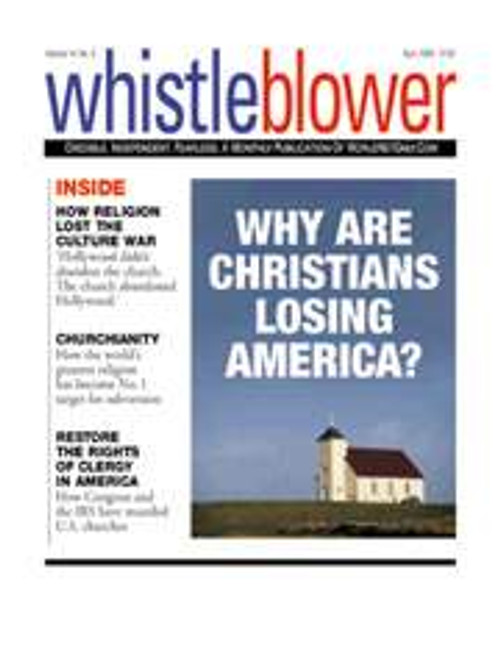You can view the print version here.
PERSECUTION RISING: The growing abuse, imprisonment, torture and murder of Christians worldwide
Recent video of 21 orange-clad Egyptian Christians being simultaneously beheaded by ISIS thugs—along with a steady stream of other horrifying reports of their crucifying, decapitating and burying Christians alive, including children—has shocked the world.
But while ISIS is unquestionably a nightmare-come-true, when it comes to the alarming increase in Christian persecution worldwide, the "Islamic State" is just the tip of the iceberg.
As WND's acclaimed Whistleblower magazine reveals in its powerfully moving April issue, "PERSECUTION RISING," today's treatment of Christians in a great many nations is disturbingly reminiscent of the brutal persecution of the early followers of Christ.
For most Americans, images of first-century Christian persecution—believers meeting furtively in remote houses with doors bolted tight, some preaching boldly in public and being dragged off to prison, others captured and paraded as spectacle to be crucified for sport by rulers like Nero—are familiar to us only through watching biblical movie epics.
Yet such is the harsh reality confronting millions of Christian believers—men, women and children—in many parts of our world, right now, in the 21st century.
In North Korea, thousands of Christians and their families are imprisoned in penal labor camps, with up to 80 executed last year for possessing Bibles and similar "transgressions." In Sudan, hundreds of Christian women and girls are flogged annually for "indecent dress," though what constitutes indecent dress is not defined by law. Iran raids church services and threatens believers, punishing Christians with prolonged detention, torture and executions—with some 400 Christians detained throughout the country since 2010, including Iranian-born American pastor Saeed Abedini.
Even America's "allies" are home to outrageous persecution of Christians: In Egypt, at least seven Coptic Christians were killed and more than 200 churches and other Christian buildings, homes and businesses recently attacked. In Pakistan, Christian women and girls experience daily violence, many targeted for rape, sexual abuse and kidnapping; a mob beat and burned to death a Christian couple last year for alleged "blasphemy." In Saudi Arabia, not a single Christian church is allowed to exist in the entire country.
What about emerging superpower China—on which the U.S. government relies financially, and Americans rely for a large share of manufactured goods they purchase? Christians face the "worst persecution since the Cultural Revolution of Mao Zedong," explains Bob Fu, former leader of the student movement crushed by the Tiananmen Square massacre and now a Christian underground church pastor. "There has been forced demolition, the removal of crosses, over 300 churches have been attacked and government sanctioned church pastors sentenced to 12 years in prison." One pastor who dared even question authorities about the forced removal of the crosses was sentenced to prison, and a court recently sentenced two Christian bookstore owners to five and two yearsÌÎÌ_ÌÎ_ÌÎÌ__ÌÎÌ_ÌÎ__ÌÎÌ_ÌÎ_ÌÎå«Ì´ÌàÌÎÌ_Ì´åÇÌÎå«ÌÎÌÊ imprisonment for "illegal business operations." Adds Fu, "Multiple believers have been attacked and hospitalized, and thousands of police were mobilized to attack a church. That has not been seen since the time of the Cultural Revolution. It's overwhelming."
Nevertheless—and here emerges the other, redemptive theme of this issue of Whistleblower—Fu expresses optimism about the long-term future of the Chinese church, noting that despite 60 years of persecution, the number of Christians has grown from less than 1 million to more than 100 million.
That's right, around the world, amid the violence, persecution, civil war and mass death, a growing number of people are converting to a belief in Christ.
Highlights of "PERSECUTION RISING" include:
- "The Armenian Genocide and my grandmother's secret" by David Kupelian, a stunning new window into the 20th century's first genocide, on its 100th anniversary this month
- "How ISIS justifies the simultaneous slaughter of 21 Coptic Christians"
- "Brave nun warns world of Islamic threat to Christians: 'ISIS is real Muslim believers who like to follow the Quran'" by Leo Hohmann
- "Country by country: The world's worst persecutors of Christians"
- "In Egypt, Christians attempting to rebuild their church face violence"
- "Understanding and responding to Christian persecution": Why in 2015, abuse of believers "is only going to worsen around the world"
- "My Middle East peace plan" by Joseph Farah, a radical solution to the region's top two problems: the security of Israel and the persecution of Christians
- "Top 50 Christian persecutors"—Islam spawns the biggest spike in violence against believers on record
- "North Korea's century of persecution" by Art Moore, on how the "Jerusalem of Asia" suffered long before communist rule came along
- "Not a single Christian church exists in Saudi Arabia"
- "Up close and personal: The human cost of ethnic cleansing" by William J. Murray, talking to Iraqi Christians forced out of Mosul at the point of ISIS' sword
- "Niger Christians: 'God found us worthy'"
- "China sees its 'worst persecution since the Cultural Revolution'": Despite decades of change, the communist regime maintains tight control
- "Why some Christian leaders in the Holy Land blame Israel for their troubles" by Art Moore: "It is safer to feel good thoughts about Islam, than to have to deal with hard truths"
- "HOW YOU CAN HELP: Agencies to help you stay informed and provide needed aid to persecuted Christians."
"Fortunately, this issue of Whistleblower is not all about darkness and misery," says Whistleblower Editor David Kupelian. "In fact, there's an amazing, transcendent theme woven into it. That theme is perfectly expressed by the courageous Romanian pastor, Richard Wurmbrand.
As this issue of Whistleblower recounts, Wurmbrand spent 14 years in a Romanian prison suffering starvation and torture for the crime of boldly preaching the Gospel of Christ in what was then a brutally repressive communist nation. When, after his release from captivity, Wurmbrand testified before the U.S. Senate's Internal Security Subcommittee, he stripped to the waist to reveal 18 deep wounds covering his torso, the result of years of unspeakable abuse.
And yet, as Wurmbrand proclaims in his classic book "Tortured for Christ," he and his fellow Christian prisoners well understood that the communists, especially those who imprisoned and tortured them, "knew not what they did."
His message, carried forward after his death by the international ministry he founded, Voice of the Martyrs, has always been: "Hate the evil systems, but love your persecutors. Love their souls, and try to win them for Christ."
So genuine was Wurmbrand's concern for the souls of his tormentors that, during his incarceration, many of them were converted to the Christian faith, ending up in prison with him—and glad for it! Moreover, consider the courageous pastor's last act before finally leaving his native country.
"In December 1965, my family and I were allowed to leave Romania," he writes:
My last deed before leaving was to go to the grave of the colonel who had given the order for my arrest and who had ordered my years of torture. I placed a flower on his grave. By doing this I dedicated myself to bringing the joys of Christ that I have to the communists who are so empty spiritually.I hate the communist system but I love the men. I hate the sin but I love the sinner. I love the communists with all of my heart. Communists can kill Christians but they cannot kill their love toward even those who killed them. I have not the slightest bitterness or resentment against the communists or my torturers.
How is such an attitude possible? Says Wurmbrand:
I have seen Christians in communist prisons with fifty pounds of chains on their feet, tortured with red-hot iron pokers, in whose throats spoonfuls of salt had been forced, being kept afterward without water, starving, whipped, suffering from cold—and praying with fervor for the communists. This is humanly inexplicable! It is the love of Christ, which was poured out in our hearts.
Finally, in words reminiscent of some of the Christian martyrs of the first century, Wurmbrand shares with the reader the presence of God he experienced in his filthy prison cell:
God is "the Truth." The Bible is the "truth about the Truth." Theology is the "truth about the truth about the Truth." Christian people live in these many truths about the Truth, and, because of them, have not "the Truth." Hungry, beaten, and drugged, we had forgotten theology and the Bible. We had forgotten the "truths about the Truth," therefore we lived in "the Truth." It is written, "The Son of man is coming at an hour when you do not expect Him" (Matthew 24:44). We could not think anymore. In our darkest hours of torture, the Son of Man came to us, making the prison walls shine like diamonds and filling the cells with light. Somewhere, far away, were the torturers below us in the sphere of the body. But the spirit rejoiced in the Lord. We would not have given up this joy for that of kingly palaces.
For a 12-month subscription to Whistleblower, click here.







